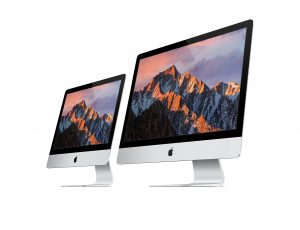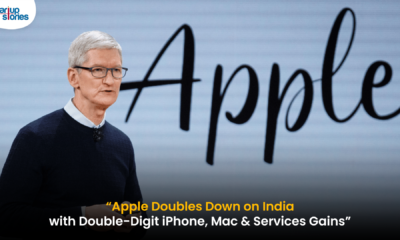Latest News
Everything Announced At WWDC17

iOS 11:
The iOS 11 will be launched later this year approximately at the same time as the new iPhone. With 375 million devices using Siri every month, the Apple assistant will get a major upgrade. This next update will give Siri deep learning capabilities such as contextual learning and predictive suggestions. The camera app will also be upgraded and will save pictures with a compression technique that uses less space on the device. Third party apps will now be able to access Apple Music directly and save discovered songs to your library automatically.
Apple HomePod:

Apple announced its own competitor to Amazon Echo and Google Home! In a bid to shake things up, Apple’s voice-enabled smart speaker HomePod was launched at the annual developer’s conference.
The HomePod can do pretty much everything that Google Home and Amazon Echo offers, but with a better sound quality. Apple’s worldwide head of marketing, Phil Schiller explained how the speaker can analyze the song it’s playing, detect the surfaces around it and adjust the output accordingly.
MacBook Pro:

While the basic design of the MacBook Pro remains untouched, all MacBook models will receive processor upgrades. The high end 15 inch MacBook Pro will now be available with seventh generation Core i7 processors that range from 2.8 GHz quad core to 3.1 GHz quad-core variants. The laptops will also have the faster storage capacity that will mean faster overall performance than the previous generations. The 13 inch MacBook Pro will also get a revamp with dual core i5 processors. The other MacBooks will also have minor processor upgrades to keep up with the other products.
iMac:

The new iMac will be packed with seventh gen Intel Core i7 and i5 Kaby Lake chips processors, Radeon Pro 500 series graphics, 5 k and 4 k display with 8 GB and 4 GB dedicated VRAM respectively with up to 4.2 GHz processing speed. The new updates focus on delivering faster results, especially when using processor-intensive applications like the Final Cut Pro. Apple has also upgraded the storage with the Fusion Drive with a fast flash storage for frequently used apps and files and a high capacity hard drive for everything else. The new iMac boasts of brighter retina display and the ability to reproduce as many as 1 Billion colors.
macOS High Sierra:
The macOS will be launched later this year and introduce new core technologies such as a new file system and better VR support. The new file system will enable the Macs to move to a proper modern file system that will ease changing and inspecting large files.
Virtual Reality:
Metal VR will make its debut on iMac. Metal will have the ability to edit 360° videos in apps like Final Cut Pro and create cutting-edge 3D VR content and HTC Vive is the headset of choice.
iPad Pro:
Apple released a new 10.5 inch iPad Pro that is largely similar to its 9.7 inch iPad. These tablets will be powered by the A10X Fusion chips and 12 core graphics with True Tone display features to alter the color and brightness according to the ambient light temperature. They will now also have a 64 GB storage option which can be increased to 512GB.
These were the major announcements in the keynote speech along with the upgrades to Apple Tv and Apple Watch OS4.
Let us know what you think in the comments below or write to us at [email protected]
Latest News
D2C Brand Neeman’s Raises $4 Million for Tier 2/3 Store Expansion & Eco-Friendly Shoes

Hyderabad, January 13, 2026 Neeman’s, India’s leading D2C footwear brand famed for sustainable shoes and patented PIXLL® technology, has raised $4 million from existing investors. This funding boosts its cumulative capital past $10 million since 2015, with a post-money valuation nearing $50 million. CEO Vijay Chahoria emphasized offline retail as the “next frontier,” planning 50+ new stores in Tier 2/3 cities like Jaipur and Lucknow to blend eco-friendly innovation with hands-on customer experiences.
In India’s booming D2C ecosystem where footwear sales hit ₹1.2 lakh crore in 2025 Neeman’s targets hybrid retail amid high online CAC and 25-30% returns. Backed by vegan, machine-washable shoes priced ₹2,000-4,000, the brand leverages PIXLL® (5x more breathable than leather) for carbon-neutral comfort. Recent 5x revenue growth to ₹100 crore ARR, 1M+ pairs sold via Myntra and stores, and awards at India D2C Summit 2025 position it ahead of rivals like Paaduks.
Neeman’s offline expansion India eyes the $15B sustainable footwear market by 2028, fueled by PLI schemes, Gen Z’s 70% eco-preference (Nielsen), and Southeast Asia exports. Challenges like real estate costs are offset by data-driven inventory and omnichannel QR tech. Watch for Q1 2026 launches in Hyderabad and Bengaluru redefining D2C success through authentic, “Wear the Change” branding.
Latest News
Centre Mulls Revoking X’s Safe Harbour Over Grok Misuse

The Centre is weighing the option of revoking X’s safe harbour status in India after its AI chatbot Grok was allegedly misused to generate and circulate obscene and sexually explicit content, including material seemingly involving minors. The IT Ministry has already issued a notice to X, directing the platform to remove unlawful content, fix Grok’s safeguards, act against violators, and submit a detailed compliance report within a tight deadline. If the government finds X’s response inadequate, it could argue that the platform has failed to meet due‑diligence standards under Indian law, opening the door to harsher action.
Under Section 79 of the IT Act, safe harbour protects intermediaries like X from being held directly liable for user‑generated content, provided they follow due‑diligence rules and promptly act on legal takedown orders. Revoking this protection would mean X and its officers could be exposed to criminal and civil liability for obscene, unlawful, or harmful content that remains on the platform, including AI‑generated images from Grok. This prospect significantly raises X’s compliance risk in India and could force tighter moderation, stricter AI controls, and more aggressive removal of flagged posts.
The Grok episode also spotlights the regulatory grey zone around generative AI, where tools can create harmful content at scale even without traditional user uploads. Policymakers are increasingly questioning whether AI outputs should still enjoy the same intermediary protections as conventional user posts, especially when they involve women and children. How the government ultimately proceeds against X over Grok misuse could set a precedent for AI accountability, platform responsibility, and safe harbour interpretation in India’s fast‑evolving digital ecosystem.
Latest News
How Pronto Is Redefining 10-Minute Home Services in India with a $25 Million Fundraise

Home services startup Pronto is in advanced talks to raise about $25 million at a near-$100 million valuation, underscoring strong investor confidence in India’s fast-growing 10-minute home services market. This potential round would be the company’s third major funding milestone after its $2 million seed and $11 million Series A in 2025, backed by marquee investors such as General Catalyst, Glade Brook Capital, Bain Capital and new participant Epiq Capital. The fresh capital is expected to further strengthen Pronto’s positioning as a leading tech-led household help platform for urban consumers.
Pronto operates a 10-minute on-demand home-services platform that connects users with trained, background-verified workers for everyday tasks like sweeping, mopping, utensil cleaning, laundry and basic cooking. Using a hub-and-spoke, shift-based model, the startup stations workers at hyperlocal hubs, enabling sub-10-minute fulfilment and more predictable earnings compared to the informal domestic-help market. Founded in 2024 by Anjali Sardana and based in Delhi NCR, Pronto has already expanded from Gurugram into major cities such as New Delhi, Mumbai, Bengaluru and Pune, and is handling around 6,000 daily bookings with nearly 1,300 active professionals as of December 2025.
The upcoming $25 million fundraise is expected to be used to enter more metros, deepen presence in existing neighbourhoods with additional hubs and upgrade Pronto’s technology for smarter routing, shift planning and real-time operations. A significant portion of the capital will also go into training, retention and benefits for its workforce to maintain consistent service quality at scale, especially as competition heats up from rivals like Snabbit and Urban Company in the rapid home services space. This near-$100 million valuation not only validates Pronto’s model but also highlights a broader shift toward organised, tech-driven domestic-help solutions in India’s largely informal home-services market.













Uyvktrxi
May 24, 2025 at 4:45 pm
Explore the ranked best online casinos of 2025. Compare bonuses, game selections, and trustworthiness of top platforms for secure and rewarding gameplayBonus offer.
MM88
November 7, 2025 at 8:56 pm
Với giao diện mượt mà và ưu đãi hấp dẫn, MM88 là lựa chọn lý tưởng cho các tín đồ giải trí trực tuyến.
谷歌外推
November 9, 2025 at 3:41 am
采用高效谷歌外推策略,快速提升网站在搜索引擎中的可见性与权重。谷歌外推
MM88
November 10, 2025 at 4:39 pm
Khám phá thế giới giải trí trực tuyến đỉnh cao tại MM88, nơi mang đến những trải nghiệm cá cược thể thao và casino sống động.
谷歌蜘蛛池
November 12, 2025 at 5:12 am
利用强大的谷歌蜘蛛池技术,大幅提升网站收录效率与页面抓取频率。谷歌蜘蛛池
GO88
November 12, 2025 at 8:26 pm
Tham gia cộng đồng game thủ tại Go88 để trải nghiệm các trò chơi bài, poker phổ biến nhất hiện nay.
Kuwin
November 21, 2025 at 3:51 am
kuwin sở hữu kho game đa dạng từ slot đến trò chơi bài đổi thưởng, mang đến cho bạn những giây phút giải trí tuyệt vời.
iwin
November 24, 2025 at 2:11 am
iwin – nền tảng game bài đổi thưởng uy tín, nơi bạn có thể thử vận may và tận hưởng nhiều tựa game hấp
J88
November 30, 2025 at 6:17 am
Đến với J88, bạn sẽ được trải nghiệm dịch vụ cá cược chuyên nghiệp cùng hàng ngàn sự kiện khuyến mãi độc quyền.
online Gambling
December 18, 2025 at 12:40 pm
online Gambling online Gambling